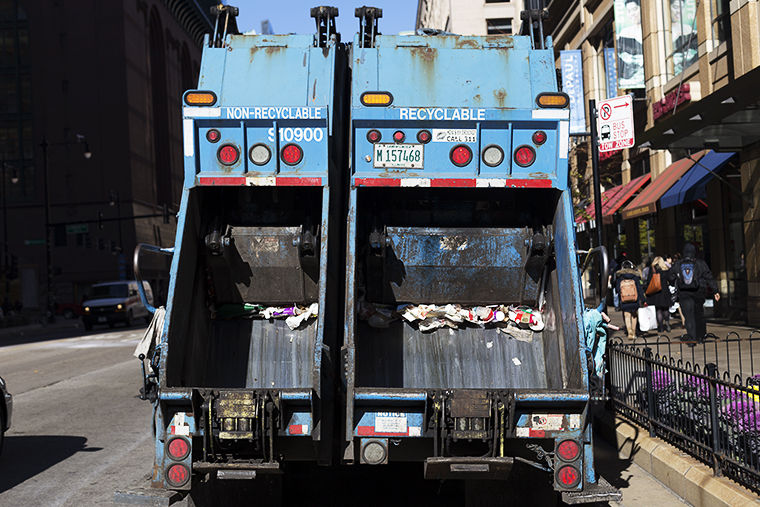‘Go Bagless’ campaign prompts recycling awareness in Chicago
Garbage truck while station outside of University Center, 525 S State St., one of the residence halls at Columbia.
December 3, 2015
The City of Chicago’s Department of Streets and Sanitation launched its “Go Bagless” public education campaign Nov. 16 to urge residents to stop using plastic bags and start recycling materials in blue carts.
Beginning Jan. 1, 2016, all recyclables will be required to be placed in designated blue carts, and any recyclables contained in bags will not be accepted, according to a Nov. 16 press release from the City of Chicago.
According to a 2010 study by the University of Illinois at Urbana-Champaign, Chicago’s waste accounts for approximately 70 percent of all waste generated in the state, producing on average 8.3 pounds of waste per person a day.
Carl Zimring, an associate professor of Sustainability Studies at the Pratt Institute and an American environmental historian from Chicago, said he thinks there is a lack of communication about Chicago’s waste and recycling system.
Zimring said Chicago developed the blue bag program—a separate blue bag where all recyclables could be picked up—20 years ago, but the plan was an expensive “disaster” because less than 10 percent of recyclables were recycled. The city then switched to a blue bin program about seven years ago. Zimring said the bin requires a lot of education of awareness which the city failed to do. Zimring said he thinks the new plan will increase the city’s recycling rate.
“My concern is that the city has consistently been awful about educating its citizens to recycle,” Zimring said. “There is a lack of trust between the city and its citizens.”
Carter O’Brien, sustainability manager at The Field Museum, said Chicago’s impoverished communities had to deal with urban trash because of the lack of awareness more than the rest of the city, and recycling efforts continue to be problematic.
O’Brien said the blue bag program was ineffective because bags would tear as they entered the trash, and the bags some people used to collect their recycling would jam sorting machinery at the Madras Rubber Factory facilities.
“These bags have never been recyclable under Chicago’s program, so people get confused with the concept of a blue bag to hold recyclables, which to be fair is what Chicago told everyone to do for many years,” O’Brien said.
O’Brien said he thinks most people do not recycle because they see it as an inconvenience.
“In my opinion, it’s hard for people to connect the dots and understand how the products are actually reused and how much energy can be saved. There’s no immediate or direct economic benefit for the individual,” O’Brien said.
Michelle Yates, an assistant professor in Columbia’s Humanities, History & Social Sciences Department, said she believes some of the problems in waste and recycling are cost related.
“It’s not cost effective for businesses and corporations to recycle. It’s cheaper for them to extract minerals and resources from the earth and continue to do that,” Yates said.
To help reduce the amount of trash produced, Yates and O’Brien said the average person can get educated and “know this is an important topic,” O’Brien said. Zimring advised that communication with the city and its residents is the most important thing.
“The city hasn’t really demonstrated an incentive structure for its residents,” Zimring said. “Recycling has been seen as a luxury that if people say in Hyde Park choose to recycle, great, but it’s not part of the city’s waste management strategy.”








